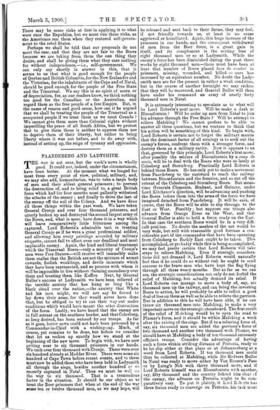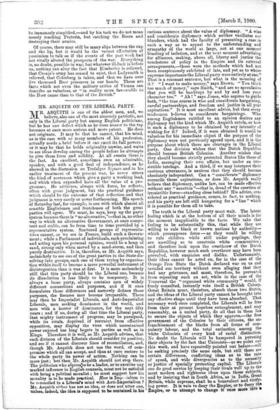PAARDEBERG AND LADYSMITH. T EE war is not over, but the
week's news is wholly good. It could not, indeed, under the circumstances, have been better. At the moment what we longed for most from every point of view, political, military, and, we may also add, humanitarian, was to take a large body of men and their ablest general prisoners ; to prevent the destruction of, and to bring relief to, a great British force which had for four months most gallantly withstood the attacks of the enemy ; and finally to drive the last of the enemy off the soil of the Colony. And we have done all those things within the past week. We have taken General Cronje and over four thousand prisoners, and utterly broken up and destroyed the second largest army of the Boers, and, what is more, have done it in a way which will leave comparatively little bitterness among the captured. Lord Roberts's admirable tact in treating General Cronje as if he were a great professional soldier, and allowing him every privilege accorded by military etiquette, cannot fail to affect even our deadliest and most implacable enemy. Again, the kind and liberal treatment which the Transvaal Boers—only a minority of Cronje's men were Free Staters—will receive will insensibly make them realise that the British are not the mixture of arrant cowards, foolish weaklings, and devils incarnate which they have been represented, and so persons with whom it will be impossible to live without claiming ascendency over them and treating them like Ko,ffirs. Next, by General Buller's success at Ladysmith we have been relieved of the terrible anxiety that has hung so long like a black cloud over the nation,—the anxiety that White and his men might, we will not say be forced to lay down their arms, for they would never have done that, but be obliged to try to cut their way out under conditions which would have meant the utter destruction of the force. Lastly, we have heard that the enemy are in full retreat on the southern border, and that Colesberg, so long desired, has been entered by our troops. As far as it goes, better news could not have been procured by a Commander-in-Chief with a wishing-cap. Much, of course, yet remains to be done, but before we consider that let us reckon up exactly how we stand at the beginning of the new move. To begin with, we have now getting near to six thousand prisoners in our hands. We took over four thousand with Cronje. There were over six hundred already at Mod der River. There were some six hundred at Cape Town before recent events, and to these must now be added those who have been held in Ladysmith all through the siege, besides another hundred or so recently captured in Natal. Thus we must be well on the way to six thousand. That is a tremendous factor in the situation. It should be our object so to treat the Boer prisoners that when at the end of the war some ten or twelve thousand men, as we may hope, will be released and sent back to their farms, they may feel, if not friendly towards us, at least in no sense aggrieved or humiliated. Again, this huge increase of the prisoners in our hands, and the consequent withdrawal of men from the Boer force, is a great gain in itself, and its complement is the setting free of eight thousand men or so at Ladysmith. While the enemy's force has been diminished during the past three weeks by eight thousand men—there must have been at least that number of Boers placed hors de combat iii prisoners, missing, wounded, and killed — ours has increased by an equivalent number. No doubt the Lady- smith men are for the present in rather a weak condition, but in the course of another fortnight we may reckon that they will be recovered, and General Buller will then have under his command an army of nearly forty thousand men in Natal.
It is extremely interesting to speculate as to what will be Lord Roberts's next move. Will he make a dash at Bloemfontein ? Will he order up men from Natal to join his advance through the Free State ? Will he attempt to relieve Mafeking ? We cannot profess to be able to answer all these questions, but we venture to think that his action will be something of this kind. To begin with, Lord Roberts is certain not to forget the military maxim that the dominant factor of all strategy is to seek out the enemy's forces, confront them with a stronger force, and destroy them as a military entity. Now it appears to us that, governed by this principle, Lord Roberts's first move, after possibly the seizure of Bloemfontein by a coup de main, will be to deal with the Boers who were so lately at Colesberg and Stormberg. Practically Lord Roberts is behind those Boers. He has only got to make a movement from Paardeberg to the eastward to reach the railway between Bloemfontein and the frontier, and so cut off the retreat of the Colesberg and Stormberg Boers. But mean- time Generals Clements, Brabant, and Gatacre, under Lord Kitchener's direction, will be advancing and pushing the Boers before them into the arms of the force we have imagined detached from ntardeberg. It will be said, of course, that the Boers will be able to slip through to the East or West. Possibly ; but suppose our troops also advance from Orange River on the West, and that General Buller is able to hold a force ready on the East. In that case the southern Boers would be in a very diffi- cult position. No doubt the meshes of the net would be very wide, but still with reasonable good fortune a con- siderable part Of the commandos that have been operating from Colesberg to Barkly East ought to be taken. This accomplished, or probably while this is being accomplished, we may feel pretty certain that Lord Roberts will take steps to relieve Mafeking. Even if strategic considera- tions did not demand it, Lord Roberts would naturally feel that if he could do so without risk he ought to send succour to the brave men who have kept the flag flying through all these weary months. But as far as we can see, the strategic considerations not only do not forbid the relief of Mafeking, but actually demand its relief. If Lord Roberts can manage to move a body of, say, six thousand men up the railway, and can bring the investing Boers to action, he will probably be able to inflict a, good deal of loss on them as well as be able to relieve the garrison. But in addition to this he will have been able, if he can throw six thousand men into Mafeking, to make a, very important move on the strategic chessboard. The first result of the relief of Mlfeking would be to open the road to Plumer's force, and it should be within Mafeking a, week after the raising of the siege. But if to a. relieving force of, say, six thousand men are added the garrison's force of two thousand and another two thousand with Pluraer, we should have at Mafeking a body of ten thousand extremely efficient troops. Consider the advantage of having such a force within striking distance of Pretoria, ready to be let slip either at that place or at Johannesburg at a word from Lord Roberts. If ten thousand men could thus be collected at Mafeking, while Sir Redvers Buller In Natal was ready to move either by Van Reenen's Pass or by Laing's Nek with thirty thousand more, and if Lord Roberts himself was at Bloemfontein with another, say, fifty thousand and the country behind him clear of the enemy, the advance on Pretoria ought to be com- paratively easy. To put it plainly, if Lord Rob .rts has three forces ready to converge on Pretoria, his taalx must be immensely simplified,—and by his task we do not mean merely reaching Pretoria, but catching the Boers and destroying their armies.
Of course, there may still be many slips between the cup and the lip, but it would be the veriest affectation of pessimism to talk as if the events of the past week had not vitally altered the prospects of the war. Everything is, no doubt, possible in war, but whatever ill-luck is before us, nothing can alter the fast that Kimberley is relieved, that Cronje's army has ceased to exist, that Ladysmith is relieved, that Colesberg is taken, and that we have over five thousand Boer prisoners in our bands. Those are facts which not even the military critics of Vienna can describe as valueless, or "in reality more favourable to the Boer cause than to that of the British."







































 Previous page
Previous page